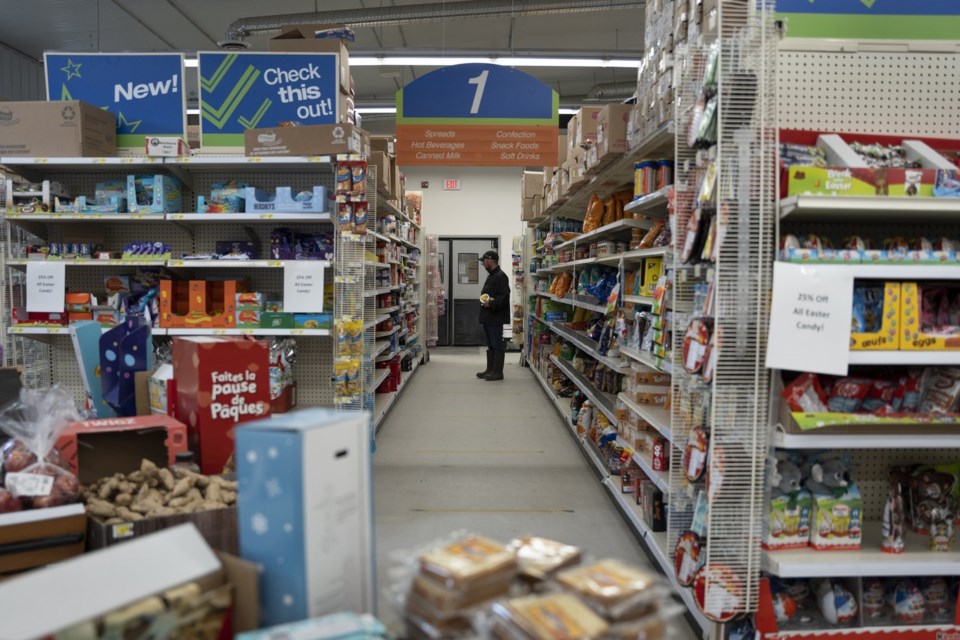ST. JOHN'S, N.L. — People in Nunavut and northern Labrador have been writing to Canadian government officials this year to say grocers were charging exorbitant prices despite receiving a federal subsidy.
The emails about the Nutrition North subsidy program ranged from desperate pleas to do something to lower food costs, to angry demands that retailers receiving subsidies be investigated.
In April, Minister of Northern Affairs Dan Vandal acknowledged there was a problem.
"I agree more work is needed to optimize the subsidy for Northerners to ensure 100 per cent of the subsidy is passed on directly to consumers," Vandal said in a note to Nunavut Family Services Minister Margaret Nakashuk obtained through an access to information request.
Some of the 17 emails from members of the public accused retailers of hiking food prices in northern communities after funding arrived earlier this year through a program known as Jordan’s Principle, which offers federal support to improve access for children to services and necessities including education and food.
"Our food prices have increased since Jordan's Principle food for kids," said one message from October. "It’s quite dismaying. Who profits on hunger?"
The emails and notes were released in response to a request by The Canadian Press for correspondence with the Department of Northern Affairs about the Nutrition North Canada program, from the beginning of the year through Oct. 1. The federally run program offers subsidies to grocery companies operating in remote Indigenous communities aimed at offsetting the cost of transporting healthy foods, and making them more affordable.
In one instance, a London, Ont., Girl Guide troop wrote asking the government to make Nutrition North more transparent. "We're worried that the money that is given does not help the cost of food in grocery stores go down enough," the letter said.
The majority of the feedback was from people writing about prices in Nunavut and in Nain, which is the northernmost community in Labrador, in the Inuit region of Nunatsiavut. The main stores mentioned are those run by Arctic Co-operatives Ltd., which primarily serves Nunavut, and the North West Company, which operates 118 Northern stores in remote communities across Northern Canada.
Names and identifying information about senders were redacted.
"Put the subsidy up. The airlines are making millions and the North West Company, but the people are starving, please, please review these rates," a Nunavut resident wrote in February.
"The stores in fact throw out foods that have rotted to the dump because they are priced too high and many people cannot afford them," said a July email about prices at Arctic Co-op and Northern stores. "Something else needs to be done to make the Nutrition North subsidy work like it was intended to, not make the people suffer and make the stores benefit."
Another calls for an investigation into prices at the grocery stores in Nunavut. "One can of corn beef hash was $11 and now $14.09 after Jordan’s (Principle) was introduced two months ago," the July email said. "Even a jar of sweet mixed pickles was over $32."
As first reported by the Nunatsiaq News last week, Nunavut Tunngavik Inc., the land-claims body representing Nunavut Inuit, confirmed it is planning to investigate whether retailers hiked food prices after communities began receiving Jordan's Principle funding earlier this year.
"NTI has heard concerns ... at our regular board meetings as well as the Nunavut roundtable on poverty reduction this past October," spokesperson Ivaluarjuk Merritt told The Canadian Press in an email Monday.
Arctic Co-operatives Ltd. is owned by the 32 independent community co-op stores across the North, noted Duane Wilson, the company's vice-president of stakeholder relations. Since the company's shareholders are its customers, there is "absolutely zero incentive" to unfairly hike prices, he said in an interview Tuesday.
Darryl Martin, a spokesperson for the North West Company said the company is working with communities in the North to deliver, via gift cards, the funding provided by Ottawa through Jordan's Principle – also known as the Inuit Child First Initiative. He said the company shares the goal "of bringing more affordable food prices" to people in the North.
In northern Labrador, one resident's February email urges Nutrition North advisory board members to "check in on Rigolet," a town where the North West Company operates the only grocery store. Several people from Nain sent emails to the department over the summer, when prices typically go down because retailers can ship food by ferry rather than pay for expensive air freight.
"Why are grocery prices still outrageously high at Northern in Nain when we are in the middle of shipping season?" said one. A 10-pound bag of potatoes at Northern was selling for more than $31, the author said. A box of fish sticks was $21.
The federal government announced last month it would launch an external, independent review of the Nutrition North subsidy program, with a final report expected in 2026. Lori Idlout, the New Democrat MP for Nunavut, said something needs to be done in the meantime to bring down "unbearable" food prices.
"I think the Liberals don't care to help alleviate poverty among Indigenous communities and northern communities," Idlout said in a recent interview. "There needs to be a way to ensure that the Nutrition North program is holding accountable corporations like the (North West Company.)"
The North West Company reported $219.8 million in gross profits for the second quarter of this year, a 7.8 per cent increase from the $204.4 million reported for the same time last year.
A Toronto Metropolitan University published a study last year showing retailers passed on to consumers just 67 cents of every dollar received from the Nutrition North subsidy program.
This report by The Canadian Press was first published Nov. 26, 2024.
Sarah Smellie, The Canadian Press



